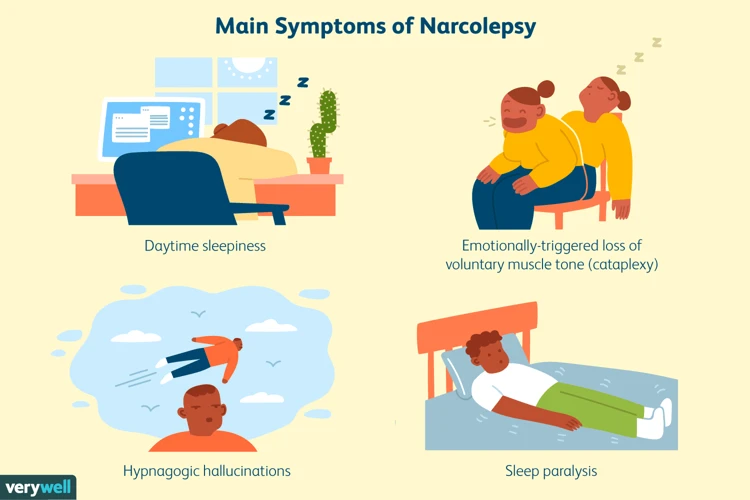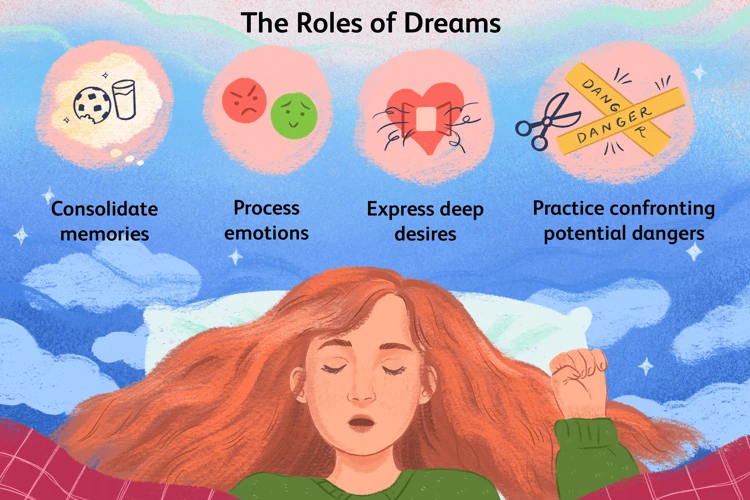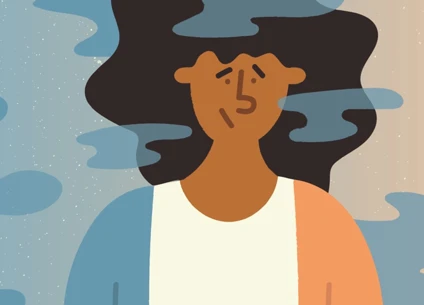Narcolepsy, a neurological disorder characterized by excessive daytime sleepiness, can have a profound impact on mental health. However, the connection between narcolepsy and mental well-being is often overlooked. In this article, we will delve into the fascinating relationship between narcolepsy, dreaming, and emotional well-being. By understanding the significance of dreams, exploring the impact of narcolepsy on mental health, and discovering ways to manage narcolepsy for better emotional well-being, we aim to shed light on this important yet often misunderstood topic. So, let’s embark on this intriguing journey into the world of narcolepsy and mental health.
Understanding Narcolepsy

Narcolepsy is a chronic neurological disorder that affects the brain’s ability to regulate sleep-wake cycles. It is often characterized by excessive daytime sleepiness, sudden and uncontrollable bouts of sleep, and fragmented nighttime sleep. While the exact cause of narcolepsy is not fully understood, research suggests that a combination of genetic and environmental factors play a role. In fact, studies have shown that certain genes, such as the HLA-DQB1 gene, are associated with an increased risk of developing narcolepsy. This highlights the importance of genetics in understanding the condition. Additionally, narcolepsy is often accompanied by other symptoms such as cataplexy, sleep paralysis, and hallucinations, which further contribute to its complexity. Cataplexy, in particular, is a sudden and temporary loss of muscle tone triggered by emotions, such as laughter or surprise. By demystifying the various aspects of narcolepsy, including its potential genetic inheritance and the impact of related symptoms like cataplexy, we can gain a deeper understanding of this condition and its implications for individuals affected by it.
The Significance of Dreams

Dreams have long fascinated humans, and their significance goes beyond mere entertainment during sleep. They serve as windows into our subconscious minds, allowing us to process emotions, memories, and experiences. Dreams can provide insight into our deepest desires, fears, and unresolved issues. They often contain symbolic representations of our emotions and can offer clues to our emotional well-being. For individuals with narcolepsy, understanding the significance of dreams becomes particularly important. Sleep disturbances, such as fragmented sleep and frequent awakenings, can disrupt the normal dream cycle. This can lead to vivid and intense dreaming experiences. Exploring the connection between narcolepsy and dreams can help individuals recognize patterns, make sense of their emotions, and find ways to enhance their emotional health. Managing narcolepsy through lifestyle changes, such as maintaining a regular sleep schedule and practicing good sleep hygiene, can also positively impact dream quality and overall well-being. So, let’s delve deeper into the intricate world of dreams and their profound significance for individuals with narcolepsy.
1. Importance of Dreams
The importance of dreams in our lives cannot be understated. They provide a window into our subconscious mind and serve various purposes essential for our overall well-being. Dreams allow us to process emotions, consolidate memories, problem-solve, and even foster creativity. During the rapid eye movement (REM) stage of sleep, which is when most dreaming occurs, our brain becomes highly active, engaging in complex processes that contribute to our mental and emotional health. Dreams can offer insights into our deepest desires, fears, and unresolved issues. They can provide a space for exploration and self-reflection, allowing us to make sense of our conscious experiences. In the context of narcolepsy, dreams take on an even greater significance. People with narcolepsy often experience vivid and intense dreams due to the disruptions in their sleep-wake cycles. Understanding the importance of dreams for individuals with narcolepsy and the role they play in their psychological well-being is crucial. By paying attention to and honoring these dreams, individuals can gain valuable insights and find ways to enhance their emotional and mental health. For helpful tips on managing narcolepsy and optimizing sleep, check out our article on lifestyle changes for narcolepsy.
2. Sleep Disturbances and Dreams
Sleep disturbances are a common feature of narcolepsy and can have a significant impact on dream patterns. Individuals with narcolepsy often experience disrupted sleep patterns, including frequent awakenings during the night and difficulty maintaining deep sleep. These disruptions can lead to an altered REM (rapid eye movement) sleep phase, which is when dreaming occurs.
During REM sleep, the brain becomes highly active and vivid dreams take place. However, individuals with narcolepsy may experience a phenomenon known as “REM intrusions,” where elements of REM sleep, including dream-like hallucinations, occur during wakefulness. These episodes can be disorienting and further disrupt sleep quality.
The content of dreams in narcolepsy can be influenced by the symptoms of the disorder itself. For example, individuals with cataplexy, a symptom often associated with narcolepsy, may experience dream-like episodes during wakefulness if they were to have an episode triggered by emotions. These dream-like experiences can be confusing and contribute to the overall disruption of sleep and the blending of wakefulness and dreaming states.
Understanding the relationship between sleep disturbances and dreams in narcolepsy is essential for individuals affected by the disorder. By managing underlying sleep disruptions, such as following lifestyle changes for narcolepsy and addressing specific symptoms like cataplexy with treatment options, individuals can improve their sleep quality and overall well-being. By doing so, they may also experience healthier and more restorative dreaming patterns, ultimately enhancing their emotional and mental health.
Impact on Mental Health

The impact of narcolepsy on mental health cannot be underestimated. The excessive daytime sleepiness and disrupted sleep patterns associated with narcolepsy can lead to a variety of emotional and psychological challenges. Individuals with narcolepsy often experience feelings of frustration, irritability, and difficulty concentrating, which can significantly affect their overall well-being. The unpredictable nature of narcolepsy symptoms can cause anxiety and social isolation, as individuals may be afraid of falling asleep or experiencing embarrassing cataplexy episodes in public. Additionally, the stigma surrounding narcolepsy can further contribute to mental health issues. It is crucial to address the psychological impact of narcolepsy and provide support and understanding to individuals facing these challenges. By demystifying related aspects like cataplexy and exploring the potential role of genetics in narcolepsy inheritance, we can develop a more comprehensive understanding of the disorder and its effects on mental health.
1. Emotional Well-being and Dreaming
Emotional well-being and dreaming are closely intertwined aspects of our mental health. Dreams can play a significant role in our emotional state, influencing how we feel and process emotions. During sleep, our brain goes through different stages of sleep, including REM (Rapid Eye Movement) sleep, which is when most of our dreaming occurs. During REM sleep, our brain is highly active, and we experience intense and vivid dreams. These dreams can evoke a range of emotions, including happiness, fear, sadness, and even stress or anxiety. Research has shown that the emotional content of dreams is often reflective of our waking life experiences and the emotions we may be dealing with. For individuals with narcolepsy, understanding the impact of emotional well-being on dreaming is crucial. The emotional disturbances that can accompany narcolepsy, such as depression or anxiety, can influence the nature and intensity of dreams. The disrupted sleep architecture associated with narcolepsy can lead to an increased propensity for vivid, emotionally-charged dreams. By recognizing the connection between emotional well-being and dreaming in the context of narcolepsy, individuals and healthcare professionals can better address the unique emotional challenges faced by those living with this condition. For more information on the genetic factors underlying narcolepsy, refer to our previous article on the role of genetics in narcolepsy inheritance. Additionally, understanding related symptoms like cataplexy can provide further insights into the complex interplay between emotions and narcolepsy. We have a dedicated article exploring the topic of demystifying cataplexy in narcolepsy that you may find helpful.
2. Dream Content and Mental Health
Dreams play a significant role in our mental health. They provide a window into our subconscious mind, allowing us to process emotions, memories, and experiences. When it comes to narcolepsy, there is a unique relationship between dream content and mental well-being. Research suggests that individuals with narcolepsy experience more vivid and intense dreams compared to those without the condition. These dreams often feature elements of sleep paralysis, hallucinations, and other narcoleptic symptoms.
The content of these dreams can have a profound impact on mental health. For example, frequent nightmares or distressing dreams can contribute to heightened anxiety and stress levels during waking hours. Additionally, the disrupted sleep patterns associated with narcolepsy can lead to dream disturbances, such as fragmented or interrupted dreams. This can further impact sleep quality and contribute to feelings of fatigue and mood instability.
One intriguing aspect of narcoleptic dreams is their connection to emotional processing. Dreams serve as a mechanism for emotional regulation, allowing us to reprocess and resolve difficult emotions. For individuals with narcolepsy, dreams may offer a unique opportunity to process the emotional challenges associated with the condition, including the anxieties and uncertainties surrounding their sleep disorder.
Understanding the relationship between dream content and mental health in the context of narcolepsy is crucial for developing effective strategies to support emotional well-being. By addressing sleep disturbances, exploring techniques for managing dream-related anxiety, and seeking therapy to address any emotional distress stemming from dream content, individuals with narcolepsy can take proactive steps toward improving their mental health and overall quality of life.
Managing Narcolepsy for Better Mental Health
Managing narcolepsy is crucial not only for improving sleep quality but also for promoting better mental health. There are various treatment options available for narcolepsy, including medication, lifestyle changes, and therapy. Medications such as stimulants and antidepressants can help control excessive daytime sleepiness and manage the symptoms of narcolepsy. Lifestyle changes like maintaining a consistent sleep schedule, creating a relaxing bedtime routine, and practicing good sleep hygiene can greatly benefit individuals with narcolepsy. Implementing strategies to manage stress and practicing relaxation techniques can also contribute to better mental well-being. Seeking support from healthcare professionals, narcolepsy support groups, and therapists can provide valuable guidance and coping strategies. By taking a comprehensive approach to managing narcolepsy, individuals can improve their overall mental health and well-being, allowing them to navigate the challenges associated with this condition more effectively.
1. Treatment Options for Narcolepsy
When it comes to treating narcolepsy, there are several options available that can help manage the symptoms and improve overall quality of life. It’s important to note that there is currently no known cure for narcolepsy, but treatments can effectively control the symptoms. One of the primary treatment approaches is medications. Stimulants, such as modafinil and methylphenidate, are commonly prescribed to help combat excessive daytime sleepiness. These medications work by increasing alertness and reducing fatigue. Another class of medications, called selective serotonin reuptake inhibitors (SSRIs), are often used to manage cataplexy and other associated symptoms by regulating serotonin levels in the brain. Additionally, sodium oxybate, a central nervous system depressant, may be prescribed to improve nighttime sleep and reduce the prevalence of cataplexy. Besides medications, certain lifestyle changes can greatly contribute to managing narcolepsy symptoms. Implementing a consistent sleep schedule, practicing good sleep hygiene, and taking regular short naps during the day can help regulate sleep patterns and combat daytime sleepiness. Maintaining a healthy diet, exercising regularly, and managing stress levels can also have a positive impact on overall well-being. It’s important for individuals with narcolepsy to work closely with healthcare professionals to find the most suitable treatment approach for their specific needs, as treatment plans can vary based on individual circumstances. By exploring these treatment options, individuals with narcolepsy can experience improved symptom control and better overall quality of life. For more tips on lifestyle changes for managing narcolepsy, refer to our related article.
2. Sleep Hygiene and Mental Health
Effective sleep hygiene practices play a crucial role in promoting better mental health for individuals with narcolepsy. Sleep hygiene refers to a set of habits and routines that help create an optimal sleep environment and improve sleep quality. For individuals with narcolepsy, it is vital to establish a consistent sleep schedule by going to bed and waking up at the same time every day, even on weekends. This regularity helps regulate the body’s internal clock and promote better sleep patterns. Additionally, creating a sleep-friendly environment is essential. This involves keeping the bedroom dark, cool, and quiet, and using comfortable bedding and a supportive mattress. Avoiding stimulants such as caffeine and nicotine close to bedtime is also advised, as they can interfere with sleep quality. Developing a relaxing bedtime routine, such as taking a warm bath or practicing gentle stretching exercises, can help signal the body that it’s time to wind down and prepare for sleep. Lastly, it is important to limit exposure to electronic devices, such as smartphones and laptops, before bedtime, as the blue light emitted by these devices can suppress the production of melatonin, a hormone that helps regulate sleep. By implementing these sleep hygiene practices, individuals with narcolepsy can optimize their sleep, improve their overall mental well-being, and better manage their symptoms.
Conclusion
In conclusion, narcolepsy is a complex neurological disorder that impacts not only sleep patterns but also mental health. Understanding the connection between narcolepsy and mental well-being is crucial in order to provide comprehensive care for individuals with this condition. Dreams play a significant role in our emotional well-being, and disruptions in sleep can have a profound impact on mental health. For those living with narcolepsy, managing the symptoms and getting proper treatment is essential. Treatment options such as medication, lifestyle changes, and sleep hygiene practices can help improve both the physical and mental aspects of narcolepsy. By addressing the challenges associated with narcolepsy and prioritizing mental well-being, individuals can enhance their overall quality of life. With continued research and awareness, we can further unravel the mysteries of narcolepsy and ensure that those affected receive the support they need to thrive.
Frequently Asked Questions
1. What are the common signs and symptoms of narcolepsy?
Common signs and symptoms of narcolepsy include excessive daytime sleepiness, sudden and uncontrollable sleep attacks, sleep paralysis, hallucinations, and disrupted nighttime sleep.
2. How is narcolepsy diagnosed?
Narcolepsy is diagnosed through a combination of medical history, symptom evaluation, sleep studies (such as a polysomnogram and multiple sleep latency test), and sometimes genetic testing. It is important to consult a healthcare professional for an accurate diagnosis.
3. Is narcolepsy genetic?
While the exact cause of narcolepsy is not fully understood, genetics are believed to play a role. Specific genes, such as the HLA-DQB1 gene, have been associated with an increased risk of developing narcolepsy, suggesting a genetic component.
4. Can narcolepsy be treated?
Yes, narcolepsy can be managed effectively through a combination of lifestyle changes, medication, and therapy. Treatment options may include stimulants to promote wakefulness, antidepressants to control cataplexy and improve REM sleep, and lifestyle adjustments.
5. How does narcolepsy impact daily life?
Narcolepsy can have a significant impact on daily life as individuals may experience excessive daytime sleepiness, difficulty concentrating, and sudden sleep episodes. This can interfere with work, academic performance, social relationships, and overall quality of life.
6. Are there any lifestyle changes that can help manage narcolepsy?
Yes, lifestyle changes can play a crucial role in managing narcolepsy. Establishing a consistent sleep schedule, practicing good sleep hygiene, avoiding triggers such as alcohol and caffeine, and incorporating regular exercise into daily routines can help improve sleep patterns and manage symptoms.
7. What is the relationship between narcolepsy and mental health?
Narcolepsy can have a significant impact on mental health. Excessive daytime sleepiness, disrupted sleep patterns, and the emotional toll of living with a chronic condition can contribute to anxiety, depression, and decreased overall emotional well-being.
8. Can narcolepsy cause hallucinations?
Yes, narcolepsy can cause hallucinations, particularly during the transition between sleep and wakefulness. These hallucinations are often vivid and dream-like, and can be unsettling for those experiencing them.
9. How does narcolepsy affect relationships?
Narcolepsy can impact relationships as individuals with narcolepsy may require understanding and support from their loved ones. Sudden sleep attacks or cataplexy episodes during emotionally charged situations may be challenging, but open communication and education about narcolepsy can help strengthen relationships.
10. Are there support resources available for individuals with narcolepsy?
Yes, there are support resources available for individuals with narcolepsy. Support groups, online communities, and healthcare professionals specializing in sleep disorders can provide education, guidance, and a sense of community and understanding for those living with narcolepsy.








